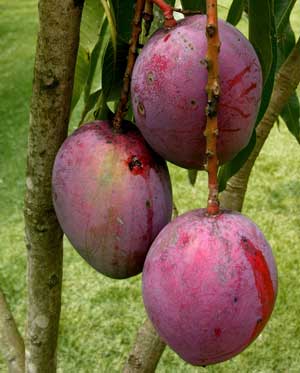| |
Mango (Mangifera indica)

|
The mango itself comes from a tropical fruit tree (the Mangifera) native to South Asia, though the trees are cultivated in a number of locations now for their fruits, including India, China, Brazil, and Mexico. They grow up to be 130 feet tall with evergreen leaves and small white flowers. The fruit ripens in the summertime, and is usually a variety of yellow-orange color with a single flat pit that houses a single seed.
Mango butter is one of South Africa’s best skin care exports. It is obtained from the kernels of the mango tree. A soft, creamy butter with a very mild scent; it is extracted from the de-shelled fruit kernels of the mango tree. Mango butter has natural softening properties, and is full of nourishing antioxidants. It has a protective effect against UV radiation. It has a high content of stearic acid, which makes it similar to cocoa butter. Mango butter has good emollient properties and lends protection against the sun. It is said to prevent drying of the skin and formation of wrinkles. Mango butter also reduces degeneration of skin cells and restores elasticity. Mango butter’s hardness makes it a great butter for stick formulations such as lip balm and lotion bars. It can be used “as is” to provide relief from the dryness of eczema and psoriasis. Dermatologists often recommend mango butter for treatment of wrinkles, as most people who use it will notice decreased signs of aging and the disappearance of lines and wrinkles within 4 to 6 weeks of daily use. Mango butter is truly an anti-aging ingredient. It rejuvenates skin due to presence of antioxidants. It helps to neutralize toxins, to generate skin cells renewal and to prevent wrinkle formation.
As with most natural fruits, the seed has just as many benefits as the flesh. The mango seed can be formed into a powder, oil, or butter, depending on how it’s processed. Typically, the butter is cold-pressed from the seeds, and is said to be similar to cocoa and shea butters, in that it’s moisturizing without being greasy.
Beyond being an amazing skin care ingredient, mango butter is sometimes used in cooking, as an alternative to regular butter, and in baking recipes.
Mango butter has a number of health benefits. Some of the most valuable for skin acids in this butter are stearic, oleic (46%), linoleic acids (unsaturated Omega-6 fatty acid). It contains vitamins A, high amount of vitamin E, C, D, group B vitamins, folic acid, calcium, iron, zeaxanthin, and magnesium.
Mango butter is wonderful for skin care also for its moisturizing essential fatty acids. It’s rich in oleic acid, a mono-unsaturated omega-9 acid; and stearic acid, a saturated fatty acid. These are ingredients that the skin readily recognizes, takes up, and uses to help add moisture to the skin, repair damage, and improve elasticity.
Here are some of the other ways mango benefits skin:
•Promotes collagen production: Because it’s rich in vitamin C, mango butter can help encourage the production of collagen, which helps give skin its shape and strength. Adequate collagen promotes a firmer appearance on skin, reducing the look of sagging and bagging.
•Natural source of vitamin A: Vitamin A is one of the natural ingredients that encourages healthy cell production and turnover. Since mango butter is a natural source of vitamin A, it helps to stimulate the cells responsible for keeping skin firm, reducing fine lines and wrinkles and increasing skin’s overall youthful look.
•Fades scars: Stretch marks, acne scars, and other old scars become more pliable and less noticeable when exposed to all the goodies in mango butter—moisturizers, antioxidants, anti-inflammatories, and skin regenerators.
•Treats dry skin: Dry patches, flakiness, eczema and dermatitis flare-ups, and even psoriasis can benefit from daily application of mango butter, which goes to work deeply moisturizing and repairing damaged skin. Oh, and don’t forget your lips—mango butter works great as a lip balm.
•Reduces the appearance of fine lines and wrinkles: Mango butter provides a more lasting type of moisturization, which can help prevent the formation of fine lines and wrinkles down the line. It also helps reduce the degeneration of skin cells, preventing that damaging process that leads to wrinkles in the first place.
•Protects from sun damage: Remember that ability to protect from radiation that we mentioned above? This is a great perk with mango butter—when you apply it to your skin you carry around an extra bit of protection from sun damage. This doesn’t mean you shouldn’t wear sun protection, though!
•Soothes sunburn: Yep, you can use it both before and after sun exposure, as mango butter helps soothe and heal sunburned skin.
•Calms insect bites and poison ivy: If you got bitten or were exposed to poison ivy on your last outing, reach for your mango butter. Its anti-allergy properties can help calm the itching and stinging so your skin can relax.
•Treats small wounds: If you’ve got scrapes, cracks, or other small wounds, mango butter can help them heal faster.
All this, yet mango butter is gentle on skin, and perfectly suitable for sensitive skin and especially great for the eye care.
Disclaimer: The information presented herein is intended for educational purposes only. These statements have not been evaluated by the FDA and are not intended to diagnose, cure, treat or prevent disease. Individual results may vary, and before using any supplements, it is always advisable to consult with your own health care provider.
|
|


















